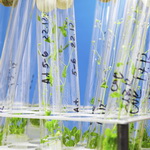
Gene from Bacteria Helps Plants Use Hardly Digestible Organic Phosphorous
October 21, 2015| |
 Natural stocks of phosphorous are expected to last for the next 60 years, but researchers from Kazan University in Russia are looking for ways to prevent a catastrophe as excess phytate levels in the soil pose a long-term risk for sustainable agriculture.
Natural stocks of phosphorous are expected to last for the next 60 years, but researchers from Kazan University in Russia are looking for ways to prevent a catastrophe as excess phytate levels in the soil pose a long-term risk for sustainable agriculture.
A group of researchers supervised by Prof. Margarita Sharipova conducted a unique bioengineering experiment: the phytase gene of Pantoea agglomerans (Gram-negative and known to be an opportunistic pathogen) was introduced to Arabidopsis plants to increase their ability to break down highly stable and insoluble phosphorus compounds.
The transgenic plants express phytase at both the transcription and translation levels and can serve as a model to better understand the effects of bacterial phytase expression in plant tissues on plant metabolism, growth and development. While some microbial phytases can be used to engineer plants that are able to grow on phosphate-depleted medium, others can be used to engineer low-phytate plants that are better suitable for animal feed and less likely to contribute to increased environmental pollution.
For more details, read the news article at the Kazan Federal University website.
| |
Biotech Updates is a weekly newsletter of ISAAA, a not-for-profit organization. It is distributed for free to over 22,000 subscribers worldwide to inform them about the key developments in biosciences, especially in biotechnology. Your support will help us in our mission to feed the world with knowledge. You can help by donating as little as $10.
-
See more articles:
-
News from Around the World
- World Food Day Celebration Highlights Social Protection and Agriculture
- 12 New Whole Genomes of Viruses Affecting Cassava Discovered
- Study Reveals Plant Sugar Transporter Involved in Carbon Sequestration
- BRRI Scientists Set for Confined Field Trials of Golden Rice
- Scientists Shed Light on Molecular Mechanisms of Bacterial Plant Disease
- Gene from Bacteria Helps Plants Use Hardly Digestible Organic Phosphorous
-
Research Highlights
- Wheat Resistance Gene Lr34 Confers Partial Blast Resistance in Rice
- Red Light-Mediated Degradation of CONSTANS Regulates Photoperiodic Flowering in Arabidopsis
- Interaction of ERF3 and WOX11 Promotes Crown Root Development in Rice
- TaGS5-3A Gene in Wheat Regulates Grain Size and Yield
-
Beyond Crop Biotech
- Genes Involved in Response to Chlamydia Infection in Koalas Identified
- Researchers Develop Bacon-flavored Superfood Seaweed
-
Announcements
- International Conference on Protein Engineering
-
Resources
- Bringing Biotech to Life: An Educational Resource
- Infographic: Biotech Foods are Safe
-
Read the latest: - Biotech Updates (April 24, 2024)
- Gene Editing Supplement (April 24, 2024)
- Gene Drive Supplement (February 22, 2023)
-
Subscribe to BU: - Share
- Tweet
